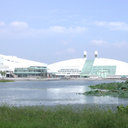Anti-inflammatory effects of ethanol extracts of Chinese propolis and buds from poplar (Populus×canadensis).
Ključne besede
Povzetek
BACKGROUND
Propolis is used widely in a number of cultures as a folk medicine and is gaining wider recognition for its potential therapeutic use, due to its wide range of biological properties and pharmacological activities, especially its anti-inflammatory effects. Despite an increasing number of studies focused on the biological activities of propolis together with its botanical sources, studies on Chinese propolis are insufficient. This study was designed to investigate the anti-inflammatory properties of ethanol extracts from Chinese propolis (EECP) and poplar buds (EEPB) from Populus×canadensis Moench (Salicaceae family).
METHODS
Phytochemical analysis of EECP and EEPB was performed via total phenolic and flavonoid content measurements followed by high-performance liquid chromatography (HPLC) analysis. DPPH and ABTS free-radical scavenging methods were used to evaluate their anti-oxidant properties. The anti-inflammatory effects of EECP and EEPB were investigated in vitro by evaluating their modulating effects on the key inflammatory cytokines and mediators in LPS/IFN-γ co-stimulated RAW 264.7 cells and by measuring nuclear factor (NF)-κB activation in TNF-α or IL-1β stimulation HEK 293 cells using reporter gene assays. Their effects on acute inflammatory symptoms (LPS-induced endotoxemia and acute pulmonary damage) were also examined in mice.
RESULTS
EECP and EEPB exhibited strong free-radical scavenging activity and significant in vitro anti-inflammatory effects by modulating key inflammatory mediators of mRNA transcription, inhibiting the production of specific inflammatory cytokines, and blocking the activation of nuclear factor (NF)-κB. The administration of EECP and EEPB (25 and 100 mg/kg) provided significant protective effects by attenuating lung histopathological changes and suppressing the secretion of LPS-stimulated inflammatory cytokines, such as interleukin-6 (IL-6), IL-10, MCP-1, TNF-α and IL-12p70 production in endotoxemic mice.
CONCLUSIONS
The results presented here reveal the potent anti-inflammatory properties of Chinese propolis and poplar buds, and provide biological information for developing suitable substitute(s) for propolis in the prevention and treatment of inflammatory diseases.




